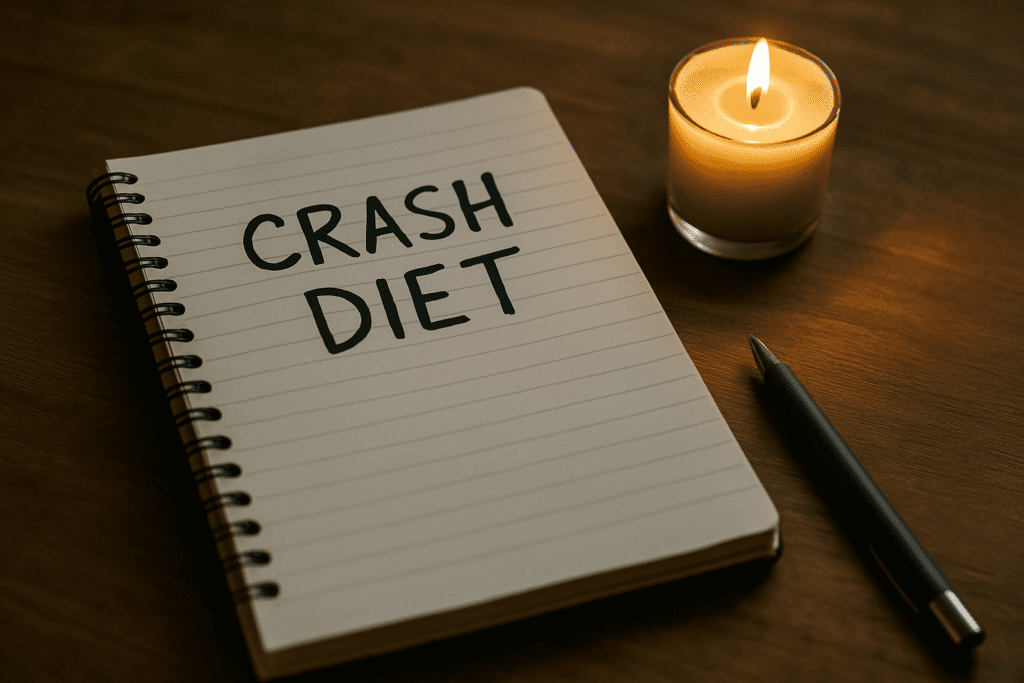In today’s culture of quick fixes and instant gratification, the allure of rapid weight loss often eclipses long-term health considerations. Phrases like “lose weight in 3 days,” “strict diet followed by rebound,” and “extreme ways to lose weight” flood social media feeds and diet forums, making it challenging to separate medically sound advice from gimmicky trends. For many individuals, especially those struggling with body image or health concerns, the temptation of a crash diet can feel like a solution rather than a risk. But as health professionals repeatedly emphasize, sustainable change rarely stems from extremes.
You may also like: Smart Healthy Eating Tips for Busy Professionals: How to Stay Nourished When You’re Always on the Go
The appeal of instant results is understandable. We live in a society that values speed and transformation, where before-and-after photos are celebrated more than consistent wellness habits. However, what often remains unspoken are the biological, psychological, and social repercussions of relying on rapid weight loss techniques. From hormonal imbalances to long-term metabolic disruption, extreme approaches to weight loss carry consequences that aren’t always visible on the surface. And while some may claim success with a strict diet or a high-intensity fasting protocol, the sustainability and safety of these methods demand deeper scrutiny.
Understanding the Psychological Drive Behind Extreme Dieting
At the core of many extreme weight loss efforts lies a complex web of psychological motivations. For some, it’s driven by a deep desire for control, while others may respond to societal pressures or internalized standards of beauty. The phrase “strict diet followed by disappointment” often reflects a recurring cycle of high hopes, temporary results, and eventual setbacks. When individuals attempt to lose weight in 3 days or embark on a crash diet for senior men without medical supervision, they may unknowingly be responding to emotional triggers rather than nutritional needs.
Eating disorders like anorexia nervosa and orthorexia are often born from a fixation on dietary control and perfection. Even in less severe cases, the use of extreme ways to lose weight can reflect an unhealthy relationship with food and body image. What begins as a seemingly harmless effort to drop a few pounds quickly can morph into obsessive behavior. Moreover, the disappointment that follows a rebound from a strict diet can intensify feelings of failure, further damaging one’s self-esteem.
Clinical psychologists point out that fad diets and crash plans can become coping mechanisms for deeper emotional distress. When life feels uncertain or overwhelming, restricting food may offer a perceived sense of order. Unfortunately, these patterns rarely lead to long-term healing and can deepen disordered eating behaviors. By addressing the root causes behind the desire for rapid weight loss, individuals can begin to shift toward healthier, more sustainable practices that honor both physical and mental well-being.

The Physiology of Rapid Weight Loss: What Happens Inside the Body
Biologically speaking, the body is not designed to respond well to abrupt, extreme dietary changes. Crash diets that promise weight loss in 3 days often rely on water loss and muscle depletion rather than actual fat reduction. When calorie intake is drastically reduced, the body shifts into a state of metabolic stress, slowing down energy expenditure to preserve its limited resources. This response, while evolutionary, directly undermines the intended goal of fat loss.
Moreover, extreme caloric restriction can lead to nutrient deficiencies that affect nearly every organ system. A strict diet lacking in protein, healthy fats, or essential vitamins can impair immune function, disrupt hormonal balance, and degrade muscle tissue. For senior men, a crash diet can be particularly risky, as muscle mass preservation becomes increasingly important with age. Losing lean body mass not only impacts strength and mobility but also affects insulin sensitivity and cardiovascular health.
The liver and kidneys are also placed under stress during extreme dieting, especially when detox teas or unregulated supplements are involved. These organs work hard to process metabolic waste, and depriving the body of essential nutrients only complicates their tasks. Additionally, the lack of sufficient fiber and hydration commonly seen in crash diets can contribute to digestive issues, further impairing overall health. The bottom line is that while short-term results may seem appealing, the internal toll of rapid weight loss is often far more damaging than it appears externally.
Crash Diets and the Rebound Effect: Why Weight Often Returns
A recurring concern voiced by health professionals is the unsustainability of extreme dietary plans. When someone follows a strict diet with little room for flexibility, it can trigger physiological and psychological backlash once the diet ends. This phenomenon, often referred to as the rebound effect, is one of the main reasons people regain lost weight—and sometimes even gain more than they originally lost.
The body, having adapted to a low-calorie state, becomes more efficient at storing fat once normal eating patterns resume. This adaptive response is rooted in our evolutionary past when food scarcity was a genuine threat. While useful in survival contexts, this mechanism works against modern dieters. In cases where individuals try to lose weight in 3 days or use a crash diet for senior men without considering long-term maintenance, the odds of weight regain are high.
From a behavioral standpoint, strict diets can be mentally exhausting. They often require the exclusion of entire food groups, rigid meal timing, and an obsessive focus on calorie counts. Over time, this level of restriction becomes unsustainable, leading to binge episodes or a complete abandonment of dietary goals. The psychological burden of constantly denying oneself pleasurable foods can further increase stress, which ironically contributes to weight gain through elevated cortisol levels. Recognizing this cycle is the first step in choosing a more balanced, sustainable path forward.
The Unique Risks of Crash Diets for Senior Men
For older adults, particularly senior men, the use of extreme ways to lose weight presents unique risks that merit careful consideration. Aging brings with it changes in metabolism, muscle mass, bone density, and hormonal balance. A crash diet for senior men that significantly reduces calorie intake or eliminates major food groups can worsen these age-related changes, putting overall health at risk.
Protein intake is especially critical for maintaining muscle mass in older adults. Extreme diets that emphasize juicing, fasting, or severe restriction often lack adequate protein, accelerating muscle wasting. This not only affects physical strength but also increases the risk of falls and fractures. Furthermore, deficiencies in calcium, vitamin D, and other essential nutrients can exacerbate osteoporosis and cardiovascular issues already common in aging populations.
Senior men may also be on medications that require food for proper absorption or effectiveness. Skipping meals or dramatically changing food intake can interfere with how these medications work, leading to unpredictable side effects. Moreover, rapid weight loss can alter body composition in ways that make it harder to track genuine health improvements, such as reductions in visceral fat or improvements in lipid profiles. The safest approach for older adults is one that emphasizes gradual, sustainable change guided by a healthcare provider.

The Illusion of the “Lose Weight in 3 Days” Promise
Many commercial diet plans and online influencers promise fast transformations through phrases like “lose weight in 3 days” or “drop 10 pounds overnight.” While these claims are enticing, they rarely reflect sustainable or medically sound outcomes. Most weight lost over such a short time frame is water weight, not fat. This means the weight returns as soon as normal eating resumes, often accompanied by feelings of failure and frustration.
The myth of the rapid transformation feeds a harmful narrative: that health is defined by a number on a scale and that faster is always better. In reality, healthy weight loss typically occurs at a rate of 1 to 2 pounds per week, allowing the body time to adjust and adapt. When individuals pursue extreme ways to lose weight, they may see immediate changes, but these changes do not equate to improved fitness, better nutrition, or long-term well-being.
Health experts urge consumers to read between the lines of marketing claims. A plan that offers short-term results without a sustainable structure or ongoing support is unlikely to serve one’s health in the long run. Instead of searching for the next 3-day miracle fix, individuals are better served by strategies that promote consistency, balance, and gradual improvement. While less glamorous, this approach is far more effective and empowering over time.
What a Truly Strict Diet Should Look Like
There’s a critical distinction between a “strict diet” in the clinical sense and one that is extreme or harmful. Medically supervised nutrition plans designed for specific conditions, such as diabetes or cardiovascular disease, can be strict in their guidelines but are evidence-based and balanced in execution. These plans include adequate protein, fiber, and essential nutrients while minimizing harmful components like excess sugar or saturated fats.
A healthy strict diet prioritizes consistency and nutrient density rather than calorie elimination. It allows room for modifications and cultural preferences and encourages mindful eating rather than food obsession. The problem arises when strictness becomes synonymous with deprivation, where entire food groups are demonized, and any deviation is seen as failure. This mindset sets the stage for a damaging relationship with food and a cycle of dieting and relapse.
Experts recommend working with registered dietitians or licensed nutritionists to develop structured plans that align with personal health goals. This is particularly important for those managing chronic conditions or taking medication. A well-constructed strict diet can support everything from athletic performance to improved biomarkers without veering into dangerous territory. Ultimately, the best diet is one that is both effective and sustainable—not simply the most restrictive.
The Role of Metabolism in Long-Term Weight Management
Understanding metabolism is key to grasping why extreme diets often backfire. The body’s metabolic rate is influenced by factors like muscle mass, age, hormones, and activity levels. When someone follows a crash diet or attempts to lose weight in 3 days, the rapid drop in caloric intake can lead to a slowdown in metabolic rate. This adaptive mechanism is designed to conserve energy but ends up making weight maintenance harder.
Muscle tissue burns more calories at rest than fat, which is why preserving muscle is essential during any weight loss journey. Unfortunately, extreme ways to lose weight often result in the loss of lean body mass, further impairing metabolism. Once the diet ends, a slower metabolism combined with previous eating patterns often results in rapid weight regain.
To counteract this, health professionals recommend strength training and adequate protein intake as part of any weight loss strategy. These practices help maintain or even increase metabolic rate, making long-term weight maintenance more feasible. A balanced approach that gradually introduces healthy habits is far more effective than attempting quick fixes that leave the metabolism compromised.

Creating a Sustainable Approach to Weight Loss
The most successful weight loss journeys are grounded in sustainability rather than speed. This means developing habits that can be maintained for months and years, not just days or weeks. Small, consistent changes—like reducing sugary beverages, walking daily, or prioritizing whole foods—add up to significant results over time.
Behavioral change experts highlight the importance of goal setting, self-monitoring, and social support in achieving lasting results. These tools help individuals stay accountable and navigate setbacks without abandoning their progress. Unlike a strict diet that feels like punishment, a sustainable plan should feel like an investment in one’s overall well-being.
Ultimately, long-term success depends on finding joy and meaning in health-promoting behaviors. When eating well and moving regularly become acts of self-care rather than self-discipline, the likelihood of success increases dramatically. A sustainable approach doesn’t just help you reach a goal—it equips you with the tools to maintain it.
Frequently Asked Questions: Are Extreme Ways to Lose Weight Ever Safe?
What are some overlooked psychological impacts of rapid weight loss strategies? Extreme weight loss tactics can cause psychological ripples that extend well beyond the physical body. While some individuals may initially feel empowered by a strict diet, followed by noticeable results, the emotional consequences can intensify over time. For many, the obsessive focus on calorie restriction or weight tracking fosters heightened anxiety, social withdrawal, or even perfectionism. In cases where someone tries to lose weight in 3 days, the pressure to succeed rapidly often leads to self-criticism when results don’t match unrealistic expectations. These stressors can also exacerbate pre-existing mental health conditions like depression or body dysmorphia, turning a diet into a mental health burden.
Can a strict diet followed by moderate eating still yield long-term results? A strict diet followed by a period of more relaxed, intuitive eating can work under certain structured conditions—but the transition must be intentional and evidence-based. If the initial strict phase is nutritionally sound and supports muscle preservation, the follow-up period may help reinforce sustainable habits. However, the danger lies in reverting too quickly to previous eating patterns without a maintenance plan. When individuals attempt to lose weight in 3 days and then resume normal habits, they risk triggering the body’s fat-storing instincts. Gradual tapering and mindful reintegration of calories are essential to preserving progress without igniting the rebound effect.
How can someone tell if a crash diet for senior men is dangerous? Warning signs that a crash diet for senior men may be harmful include persistent fatigue, dizziness, irregular heartbeats, and noticeable muscle loss. Older adults have different physiological needs, and depriving the body of essential nutrients—especially protein and calcium—can lead to a decline in bone density and muscle function. Furthermore, many senior men take medications that require consistent food intake, making crash diets especially risky. It’s also crucial to monitor mood and cognitive function, as extreme caloric deficits can impair concentration and emotional regulation. When extreme ways to lose weight are prioritized over balanced nutrition, the risks for this demographic are magnified.
Is it ever medically appropriate to attempt to lose weight in 3 days? There are very limited scenarios where a short-term weight loss plan is considered safe or beneficial, such as preparing for a surgical procedure where rapid reduction of visceral fat or water retention is necessary. In such cases, the process is supervised closely by healthcare providers to avoid complications. For the general population, however, trying to lose weight in 3 days is not medically advisable due to the strain it places on the cardiovascular, renal, and endocrine systems. The weight lost is primarily water and glycogen, not fat, and often returns quickly once normal hydration and carbohydrate levels are restored. Any benefit derived is superficial and does not translate into lasting health gains.
What role does metabolism play in the failure of strict diets over time? The body’s metabolism adapts to caloric restriction by slowing down energy expenditure, a process known as adaptive thermogenesis. This phenomenon is a primary reason strict diets often yield diminishing returns the longer they are followed. Over time, the body burns fewer calories at rest, and the same intake that once led to weight loss may begin to cause weight maintenance or even gain. This can be especially frustrating for those who begin a strict diet followed by plateauing results despite continued effort. To counteract this, incorporating resistance training and gradually increasing caloric intake can help reset metabolic function.
Why do some people experience emotional distress after a strict diet? Emotional fallout following a strict diet is not uncommon. Many individuals internalize weight loss goals as measures of self-worth, and failing to maintain results can lead to guilt, shame, or self-loathing. When a strict diet is followed by binge episodes or emotional eating, it creates a pattern of psychological whiplash that is hard to break. Social isolation may also occur when people avoid events that involve food, fearing they’ll lose control or deviate from the plan. Over time, these patterns can erode self-confidence and negatively impact mental health, particularly if one’s identity becomes entangled with dietary success.
How do extreme ways to lose weight affect long-term hormonal health? Extreme ways to lose weight can disrupt several key hormonal systems, including those regulating hunger (ghrelin and leptin), stress (cortisol), and reproduction (estrogen and testosterone). For instance, a crash diet for senior men may lead to reduced testosterone levels, exacerbating age-related declines in muscle mass and libido. For others, prolonged restriction may result in irregular menstrual cycles, hair thinning, or sleep disturbances. These hormonal shifts are the body’s way of conserving energy and signaling that something is amiss. Restoring balance often requires a gradual return to adequate nutrition and may take months depending on the severity and duration of the restriction.
Are there safer alternatives to a crash diet for senior men? Yes, safer alternatives include moderate caloric deficits paired with increased physical activity, especially resistance exercises tailored to older adults. Meal timing strategies like intermittent fasting can also offer metabolic benefits when implemented cautiously and with professional oversight. Instead of relying on extreme ways to lose weight, older individuals may benefit from high-protein, nutrient-dense meals that support muscle retention and satiety. Regular check-ins with a dietitian or geriatrician can ensure that nutrient needs are met and any medical conditions are monitored. These alternatives not only reduce health risks but also improve quality of life and energy levels.
How do social factors influence the appeal of losing weight in 3 days? The societal emphasis on instant gratification, combined with unrealistic body ideals propagated through social media, fuels the appeal of promises like “lose weight in 3 days.” Many individuals are swayed by transformations that appear effortless and immediate, even if the underlying methods are unsustainable or harmful. Peer pressure, upcoming events like weddings or reunions, and even fitness challenges can drive people to adopt extreme ways to lose weight without considering the consequences. For some, the desire for social validation outweighs the importance of long-term health. Raising awareness about the dangers and promoting body neutrality can help shift this mindset toward a more balanced view of wellness.
What recovery strategies are effective after abandoning a strict diet? The key to recovering from a strict diet is embracing flexibility and self-compassion. Rather than falling into another cycle of restriction, individuals should focus on gradually reintroducing balanced meals, mindful eating practices, and regular movement. Emotional support, whether through therapy or community groups, can also be crucial for breaking the all-or-nothing mindset. If a strict diet is followed by weight regain, reframing the experience as a learning opportunity rather than a failure can be empowering. Building a foundation of sustainable habits is ultimately more beneficial than chasing short-term, dramatic changes.
Final Thoughts: Rethinking Extreme Weight Loss in the Pursuit of True Health
As tempting as it may be to pursue extreme ways to lose weight, the evidence consistently supports a more measured, thoughtful approach to lasting wellness. From the false promise of plans that claim you can lose weight in 3 days to the hidden risks of a crash diet for senior men, the consequences of extreme dieting are real and far-reaching. A strict diet can be a helpful tool when structured with balance and medical oversight, but when strictness crosses the line into obsession or malnutrition, the dangers outweigh the benefits.
Health is a lifelong journey, not a weekend project. Rather than chasing temporary results through deprivation, the focus should be on building a foundation of habits that nourish both body and mind. Sustainable weight loss involves more than just calorie counting; it requires emotional resilience, metabolic understanding, and a willingness to prioritize long-term outcomes over short-term appearances.
By choosing evidence-based strategies and leaning on the guidance of qualified professionals, individuals can break free from the cycle of crash diets and rebound weight gain. Whether you’re considering a strict diet or wondering if you can lose weight in 3 days, remember this: the safest path is the one that respects your body’s needs and supports your overall well-being. In the end, health is not just about what you lose—it’s about what you gain along the way.
rapid fat loss risks, sustainable weight loss tips, safe dieting strategies, weight loss for older adults, rebound weight gain, muscle loss during dieting, metabolic slowdown, healthy eating habits, mindful nutrition choices, balanced diet plan, fitness for senior men, crash diet recovery, yo-yo dieting effects, emotional eating triggers, psychological effects of dieting, hormone imbalance and weight, calorie restriction dangers, long-term health and wellness, dietitian-recommended plans, metabolism and aging
Further Reading:
The Military Diet: All You Need to Know
Disclaimer
The information contained in this article is provided for general informational purposes only and is not intended to serve as medical, legal, or professional advice. While NewsHealthWatch strives to present accurate, up-to-date, and reliable content, no warranty or guarantee, expressed or implied, is made regarding the completeness, accuracy, or adequacy of the information provided. Readers are strongly advised to seek the guidance of a qualified healthcare provider or other relevant professionals before acting on any information contained in this article. NewsHealthWatch, its authors, editors, and contributors expressly disclaim any liability for any damages, losses, or consequences arising directly or indirectly from the use, interpretation, or reliance on any information presented herein. The views and opinions expressed in this article are those of the author(s) and do not necessarily reflect the official policies or positions of NewsHealthWatch.

